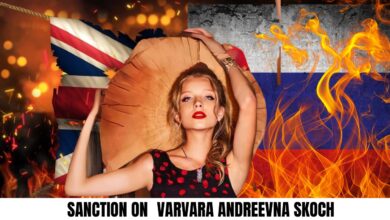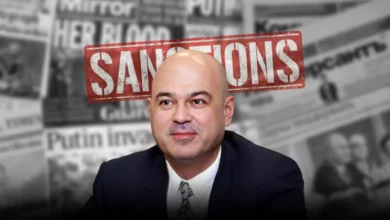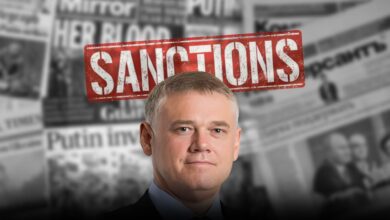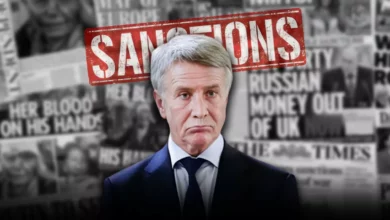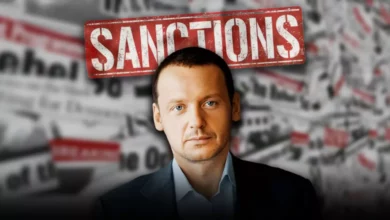Latest Sanctions On Denis Alexandrovich Bortnikov [ Denis Bortnikov ] By 11 Countries
![Latest Sanctions On Denis Alexandrovich Bortnikov [ Denis Bortnikov ] By 11 Countries](https://www.russianoligarchs.com/wp-content/uploads/2023/11/Sanctions-On-Denis-Alexandrovich-Bortnikov-Denis-Bortnikov-By-11-Countries-1.png)
Denis Alexandrovich Bortnikov [ Denis Bortnikov ] is the Deputy President & Chairman of VTB Bank.
Denis Bortnikov is under sanctions from New Zealand, Ukraine, Japan, Switzerland, Australia, Canada, Belgium, United Kingdom of Great Britain and Northern Ireland, European Union, United States of America and France.
Who Is Denis Alexandrovich Bortnikov [ Denis Bortnikov ]
Denis Bortnikov Sanctioned By US

Elites close to Putin continue to leverage their proximity to the Russian President to pillage the Russian state, enrich themselves, and elevate their family members into some of the highest positions of power in the country at the expense of the Russian people. Sanctioned oligarchs have used family members to move assets and to conceal their immense wealth. The following designations target powerful Russians in Putin’s inner circle believed to be participating in the Russian regime’s kleptocracy and their family members.
Denis Aleksandrovich Bortnikov, son of Aleksandr Vasilievich Bortnikov
Aleksandr Vasilievich Bortnikov (Aleksandr Bortnikov) is the Director of the Federal Security Service (FSB) of the Russian Federation and a permanent member of the Security Council of the Russian Federation. Aleksandr Bortnikov was previously designated in March 2021 for being an official of the GoR, and for acting or purporting to act for or on behalf of, directly or indirectly, the FSB. Aleksandr Bortnikov’s son, Denis Aleksandrovich Bortnikov (Denis Bortnikov), is currently a Deputy President of Russian-state owned financial institution VTB Bank Public Joint Stock Company (VTB Bank) and a Chairman of the VTB Bank Management Board.
On February 22, 2022 , OFAC redesignated Aleksandr Bortnikov and designated his son Denis Bortnikov pursuant to E.O. 14024 for being or having been leaders, officials, senior executive officers, or members of the board of directors of the GoR. Denis Bortnikov was also designated pursuant to E.O. 14024 for being the spouse or adult child of Aleksandr Bortnikov, a person whose property or interests in property are blocked for being or having been a leader, official, senior executive officer, or member of the board of directors of the GoR.
Denis Aleksandrovich Bortnikov Sanctioned By UK

On 24 February 2022 . the UK’s sanctioned against 120 businesses and oligarchs as a part of a concerted strike against the Putin regime carefully co-ordinated with their international allies including the US, the EU, and other G7 partners.
Among the targets are:
- VTB, Russia’s second-largest bank with assets totalling £154bn and 95,000 employees.
- freeze the assets of all Russian banks including, today, a full asset freeze on VTB, Russia’s largest bank. Co-ordinated with the US this is by far the single biggest financial sanction in history. Individuals and companies whose assets are frozen will be unable to undertake any business in the UK or with UK nationals
- prevent Russian companies from borrowing on the UK markets, effectively ending the ability of those companies closest to Putin to raise finance in the UK. This is in addition to banning the Russian state itself from raising funds in the UK, as previously announced
- take a power to prevent designated banks from accessing Sterling and clearing payments through the UK. This will match the power the US already has. Banks subject to this measure will be unable to process any payments through the UK or have access to UK financial markets
- Denis Bortnikov, Deputy President of Russia’s largest bank VTB. Bortnikov is the son of Alexander Bortnikov, the head of the Federal Security Service (FSB) which was responsible for the poisoning of political activist Alexey Navalny in August 2020 with a banned chemical agent from the Novichok group
Denis Aleksandrovich Bortnikov Sanctioned By EU
On 23 February 2022, EU sanctioned Denis Bortnikov, the deputy president of state-owned VTB – , Russia’s second-largest bank, he is the son of Alexander Bortnikov, the director of the Federal Security Service, the successor to the KGB.
The reasons for Sanctions is as follows:
Denis Bortnikov is the son of, and as such is associated with, Alexander Bortnikov – Director of the Federal Security Service (FSB) and Permanent Member of the Security Council of the Russian Federation, who is involved in shaping the policy of the Russian Government threatening the territorial integrity, sovereignty and independence of Ukraine.
He is the deputy President and Chairman of VTB Bank Management Board, in which position he works to legitimise his father’s shadow/ illegal income. He is therefore also supporting financially Russian decision-makers responsible for the annexation of Crimea and the destabilisation of Eastern Ukraine.
Associated individuals: Alexander Vasilyevich Bortnikov (father); Tatiana Borisovna Bortnikova (mother)
On February 26, 2022, a joint statement by the US, EU, UK, France, Germany, Italy and Canada condemned Russia’s attack on Ukraine. The states committed to implement further measures, including:
- removing certain Russian banks (as of yet unidentified) from their ability to use the SWIFT messaging system;
- imposing restrictions to prevent the Russian Central Bank from deploying its international reserves in ways that undermine the impact of the sanctions regimes in place;
- launching a transatlantic task force to identify and freeze assets of sanctioned individuals and companies held within each nation’s jurisdiction; and
- stepping up coordination against disinformation and other forms of hybrid warfare.
Blocking selected Russian banks from their ability to use the SWIFT system is a rare step which will affect their ability to operate in the global financial system. The only other countries whose institutions have been blocked previously from SWIFT are Iran and North Korea.
Other Countries
Several other countries have imposed restrictions similar to those of the US, EU, and UK.
Japan. Japan has announced the following measures:
- a ban on the issuance and trading of new Russian sovereign bonds in Japan;
- asset freezes targeting Bank Rossiya, PSB, and VEB;
- export controls on high-tech products such as semiconductors to military-linked groups; and
- a suspension of visa issuances for certain Russian individuals and entities.
On February 27, 2022, Japan further announced that it would join the US, EU, UK, Canada, France, Germany and Italy in blocking certain Russian banks’ access to SWIFT. All G7 countries have, therefore, now agreed to the SWIFT ban.
Australia. On February 23, 2022, Australia announced that it would impose targeted financial sanctions and travel bans on members of Russia’s National Security Council, as well as targeted financial sanctions on Russian institutions including Bank Rossiya, and PSB (in addition to existing sanctions against VEB).
This was followed on February 25, 2022 by an announcement that fresh sanctions would be placed against “oligarchs whose economic weight is of strategic significance to Moscow” and more than 300 members of the Russian State Duma, among others. On February 26, 2022, the Minister for Foreign Affairs further announced that she would be seeking to directly sanction President Putin and Foreign Minister Lavrov.
Also in recent days, Australia has adopted:
- The Autonomous Sanctions Amendment (Russia) Regulations 2022, introducing new listing criteria allowing the Minister for Foreign Affairs to designate a person or entity for targeted financial sanctions, or declare a person for a travel ban, including if the person or entity is engaging in activity or performing a function that is of economic or strategic significance to Russia, or a current or former minister or senior government official (or an immediate family member of such a person).
- The Autonomous Sanctions Amendment (Ukraine Regions) Regulations 2022, extending to the DNR and LNR from March 28, 2022 sanctions measures already applied to Crimea and Sevastopol. The Regulations include a power for the Minister for Foreign Affairs to specify other areas of Ukraine, should they fall under Russian influence, to which these measures would then apply. The measures target exports and commercial activity in relation to the transport, telecommunications, energy and exploitation of oil, gas, and mineral reserve sectors, and prohibit all imports.
Australian sanction laws apply to activities in Australia and to activities undertaken overseas by Australian citizens and Australian-registered bodies corporate.
New Zealand. While lacking its own sanctions law, New Zealand has announced in the wake of the Russian invasion of Ukraine:
- travel bans on Russian government officials and others associated with the Russian invasion of Ukraine;
- a suspension of consultations between the foreign ministries of Russia and New Zealand; and
- a blanket ban on exports to the Russian military.
Taiwan. Taiwan has likewise announced its intention to impose sanctions targeting Russia in response to the crisis in Ukraine. While details have not been announced, it is anticipated that the measures may include restrictions on energy imports and high-tech exports such as semiconductors.
Canada. Canada has imposed far-reaching sanctions under its Special Economic Measures Act and associated Regulations in response to Russia’s actions in Ukraine. On February 24, 2022, Canada published additional amendments to the Special Economic Measures (Russia) Regulations and Special Economic Measures (Ukraine) Regulations, imposing further restrictive measures against Russia, along with the DNR and LNR. The new sanctions include, among other measures:
- a prohibition for any person in Canada or Canadian outside Canada to engage in financial transactions with certain listed Russian financial institutions, including the Russian Central Bank;
- the addition of members of the Russian State Duma who voted in favor of recognizing the independence of the DNR and LNR;
- the inclusion of a number of Russian financial institutions as designated entities subject to restrictions, including Sberbank, VTB, PSB, and VEB;
- the designation of other Russian corporations, including Rostec, Gazprom and Transneft; and
- export bans in respect of certain controlled goods or technology destined for Russia, or the DNR and LNR.
This was followed by an announcement on February 25, 2022 that Canada would be adding to its list of designated individuals and entities President Putin, Putin’s Chief of Staff Sergei Ivanov, and Foreign Minister Lavrov, along with various Belarusian leaders for their role in aiding the Russian invasion of Ukraine.
As noted above, Canada has also joined the other G7 countries and the European Commission in stating its intention to exclude Russian banks from SWIFT.




